Video: Marchers mark route of Srebrenica genocide 30 years later
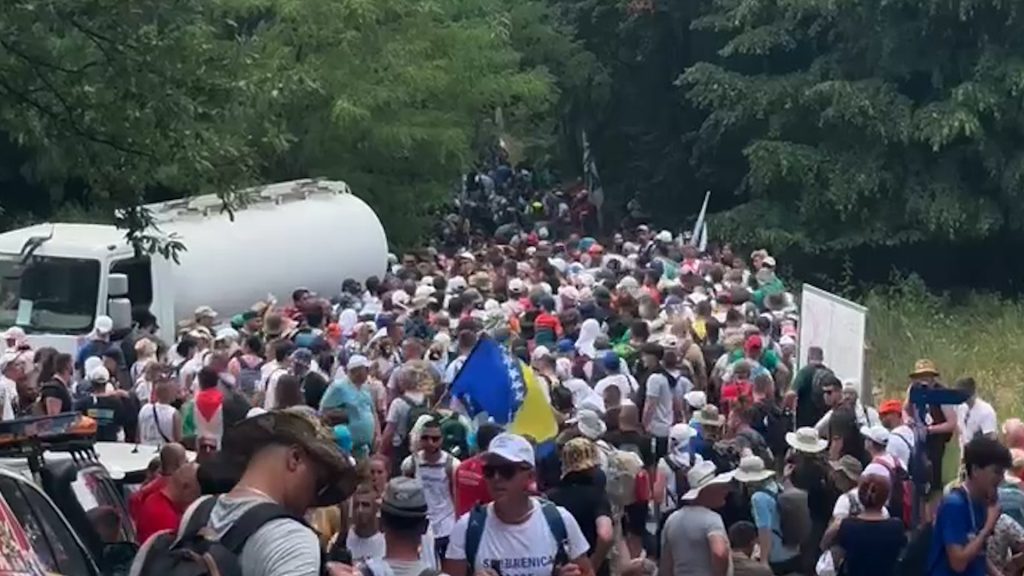
NewsFeed Thirty years after the Srebrenica massacre, thousands have embarked on the annual three-day march along the same route where more than 8,000 Bosnian men and boys were executed, calling for Serb leaders to finally recognise the atrocity as a genocide. Published On 9 Jul 20259 Jul 2025 Adblock test (Why?)
Israel says it launched ‘special, targeted operations’ in southern Lebanon
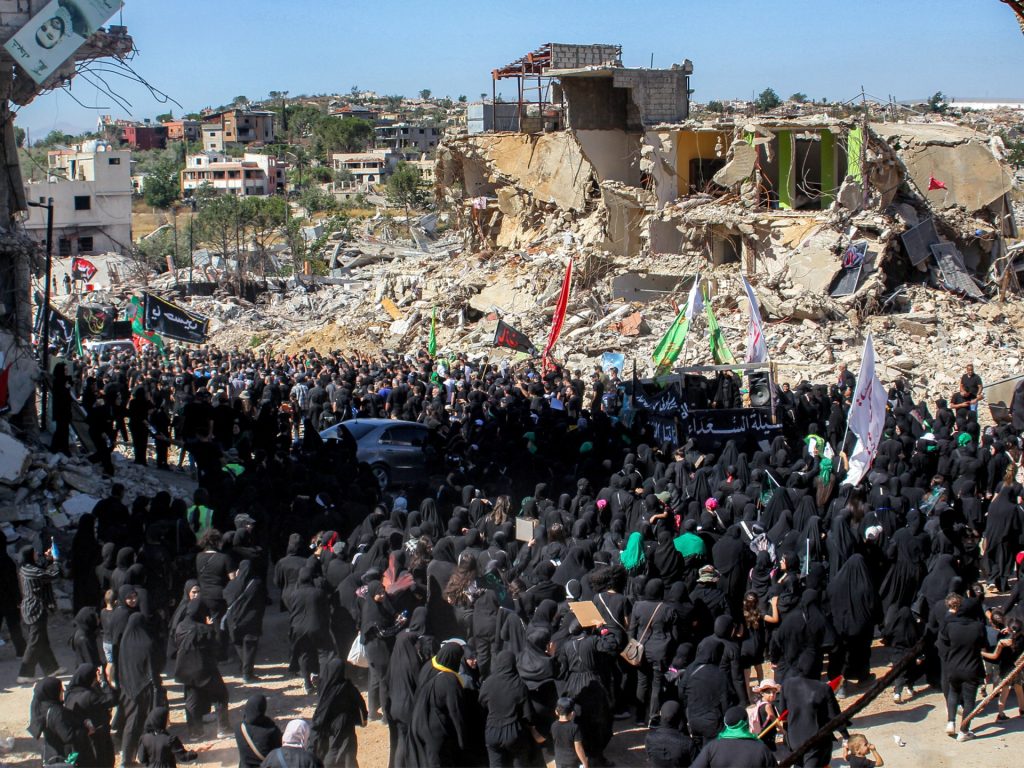
Army shares video of troops on ground in ‘targeted nighttime operation’ amid near-daily attacks against neighbour. Israeli troops have entered southern Lebanon, the military says, to dismantle infrastructure belonging to Hezbollah, in its latest near-daily violation of its November ceasefire with the Lebanese armed group. The military said in a statement on Wednesday that it had launched “special, targeted operations” to destroy Hezbollah facilities and prevent the group from “reestablishing itself in the area”. It claimed the ground incursion had been launched, acting on “intelligence information and the identification of Hezbollah weapons and terrorist infrastructure in several areas of southern Lebanon”. The army statement said the 9th Brigade was in the Labbouneh area, while troops from the 300th Brigade were operating in the Jabal Blat area further west – both within sight of the border. It shared a video captioned “footage from a targeted nighttime operation of the 9th Brigade in southern Lebanon”, troops were shown walking on the ground. The army has not commented on whether the incursion marks the first time it has operated on the ground in Lebanon since agreeing to the United States-brokered ceasefire in November 2024. Since striking the deal, which sought to end more than a year of hostilities with Hezbollah – including several months of all-out war – Israel has continued to carry out near-daily strikes across Lebanon, including multiple strikes on the capital, Beirut. Israel says it is targeting Hezbollah arms depots and fighters, but numerous civilians have been killed and wounded, and residential buildings were destroyed. Advertisement Israeli attacks across Lebanon The new operation was announced as Israel intensified its strikes in Lebanon amid Hezbollah’s weakened position, the Lebanese army staying on the sidelines and the international community’s failure to pressure Israel to abide by the truce. Lebanese President Joseph Aoun has repeatedly asked the US and Israel to rein in Israel’s attacks on the country. On Sunday, the Hezbollah leader Naim Qassem said the group remains open to peace, but it will not disarm or back down from confronting Israel until it ends its air raids and withdraws from southern Lebanon. “We cannot be asked to soften our stance or lay down arms while [Israeli] aggression continues,” Qassem told thousands of supporters gathered in Beirut’s southern suburbs for Ashura, an important day in the Shia Muslim calendar. Under the ceasefire deal, Hezbollah was to pull its fighters back north of the Litani River, about 30 kilometres (20 miles) from the Israeli border, leaving the Lebanese army and United Nations peacekeepers as the only armed parties in the region. Israel was required to fully withdraw its troops from the country, but has kept them in five locations it deems strategic to its own interests. Thomas Barrack, an adviser to US President Donald Trump who serves as Washington’s ambassador to Turkiye and special envoy for Syria, returned to Beirut on Monday, praising the Lebanese government’s response to a US proposal aimed at disarming Hezbollah amid Israel’s continued military presence in the country. Since the Gaza war started in October 2023, Israel has also carried out attacks against members of Palestinian factions that maintain a presence in various areas of Lebanon, mostly in camps for Palestinian refugees. On Tuesday, an Israeli strike on a vehicle near the northern Lebanese city of Tripoli killed at least three people and injured 13 others, according to Lebanon’s Ministry of Health. The military later announced that it had killed Mehran Mustafa Ba’jur in the strike, describing him as one of Hamas’s key commanders in Lebanon. It underscored that Israel’s assaults are being launched across the country, not just in the south. It was the first time an Israeli assassination had taken place in the area since the truce. Adblock test (Why?)
Why was Christian Horner sacked as Red Bull F1 team boss?
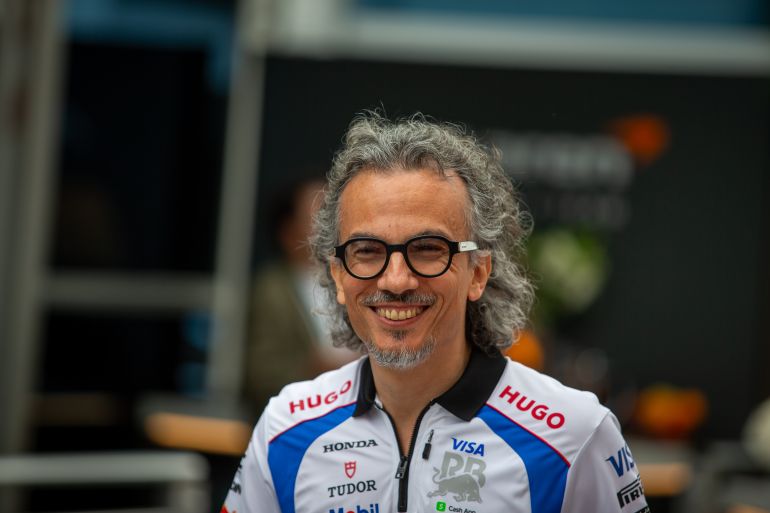
Christian Horner has been sacked as Red Bull team principal with immediate effect after 20 years, the Red Bull Racing Formula One team announced on Wednesday. The 51-year-old oversaw a period of dominance by the team, winning the drivers’ championship eight times – including the past four titles with Max Verstappen – and adding six constructors’ crowns. Who will replace Horner at Red Bull Racing? Horner, who has been in charge of Red Bull since the team was formed in 2005, will be replaced by the principal of sister team Racing Bulls, Laurent Mekies. A motorsport aerodynamics specialist, the French-born Mekies entered Formula One in the early 2000s and had stints working with Arrows, Minardi, Toro Rosso and Ferrari before joining Racing Bulls as team principal in 2024. “I think he has a very, very good understanding of the business, having started as an engineer and then worked at the FIA,” said Fred Vasseur, current F1 team principal at Ferrari, when Mekies left the famous Italian team in July 2023. Laurent Mekies is the new team principal of Red Bull Racing after the shock exit of Christian Horner [File: Alessio Morgese/Stefano Facchin/NurPhoto via Getty Images] No reason given for Horner sacking Horner was sacked as Red Bull’s team principal with immediate effect. The team’s official media statement, released on Wednesday, reads: “Red Bull has released Christian Horner from his operational duties with effect from today [Wednesday, July 9, 2025] and has appointed Laurent Mekies as CEO of Red Bull Racing. Oliver Mintzlaff, CEO Corporate Projects and Investments, thanked Christian Horner for his exceptional work over the last 20 years.” “We would like to thank Christian Horner for his exceptional work over the last 20 years,” said Mintzlaff. “With his tireless commitment, experience, expertise and innovative thinking, he has been instrumental in establishing Red Bull Racing as one of the most successful and attractive teams in Formula 1. Thank you for everything, Christian, and you will forever remain an important part of our team history.” Martin Brundle, an ex-F1 driver, current race commentator and friend of Horner, told Sky Sports News: Advertisement “I am due to speak to Christian later. I put a message to him saying, ‘I am sorry to read this, can we have a chat before I am due to go on TV because I want to know more about it from his point of view’. “He wasn’t able to do that. What he did say was that no reason was given to him as to why he is being released.” Horner, right, and F1 commentator Martin Brundle chat in the paddock prior to qualifying ahead of the F1 Grand Prix of Australia at Albert Park Circuit on March 23, 2024, in Melbourne, Australia [Kym Illman/Getty Images] A difficult 18 months for Horner Horner’s dismissal follows a challenging period on several fronts for the team principal. His exit from the team comes nearly a year-and-a-half after it was leaked that a female employee had accused Horner of sexual harassment and coercive, controlling behaviour. Horner was twice cleared of the claims by Red Bull headquarters, situated in Austria. At the same time, Max Verstappen’s father, Jos, called for Horner to leave his position and claimed that the Briton’s presence could tear the team apart in a March 4, 2024, interview. Jos told The Daily Mail that “there is tension while he remains in position”, referring to Horner. He added, “The team is in danger of being torn apart. It can’t go on the way it is. It will explode. He is playing the victim when he is the one causing the problems.” The early-2025 departure of Adrian Newey – the former chief technology officer of Red Bull Racing and widely considered one of the greatest motorsport designers in F1 – to rival team Aston Martin was a huge loss to the Milton Keynes-based team and to Horner personally. Newey had joined Red Bull in 2006, just months after Horner’s appointment, with the pair forming one of the most successful F1 management partnerships in history. Horner, married to former ‘Spice Girl’ popstar Geri Halliwell, right, had been accused of inappropriate behaviour by a female colleague but was twice cleared of the claims by the team’s parent company, Red Bull GmbH [James Bearne/Getty Images] How successful was Horner as Red Bull boss? Under Horner’s leadership, Red Bull won their first world championship in 2010, with German driver Sebastian Vettel taking the first of four consecutive drivers’ titles. Following a multiyear period of dominance by archrival Mercedes, Red Bull, this time with Max Verstappen of the Netherlands as their star driver, entered a second championship window, winning four more drivers’ titles consecutively from 2021 to 2024. Advertisement In 2023, Horner presided over the most dominant season in Formula One history, with the team winning 21 of 22 races, and Verstappen setting a new F1 record with 10 consecutive victories. Horner, left, celebrates winning the 2021 F1 World Drivers Championship with driver Max Verstappen at Yas Marina Circuit on December 12, 2021, in Abu Dhabi, United Arab Emirates [Bryn Lennon/Getty Images] Will Max Verstappen stay at Red Bull Racing? At the midway point of the 2025 season, Verstappen trails McLaren duo Oscar Piastri and Lando Norris in the drivers’ standings and has all but conceded the drivers’ title for this season. As far back as April 13, Verstappen was already pessimistic about the prospects of winning a fifth straight drivers’ championship. “McLaren are not my rivals right now. I am just taking part in this world championship,” Verstappen said, as quoted by nl.motorsport.com. When pressed further if he meant he doesn’t see himself competing for the 2025 drivers’ title, he replied: “No, I don’t.” In recent days, and not for the first time, Verstappen has been linked with a move to rival Mercedes, possibly as soon as next season. Brundle told Sky Sports News that Horner’s exit from Red Bull may defuse tensions, resulting in Verstappen re-signing with the only F1 team
Netanyahu discussing ‘opportunities for peace’ in Gaza with Trump
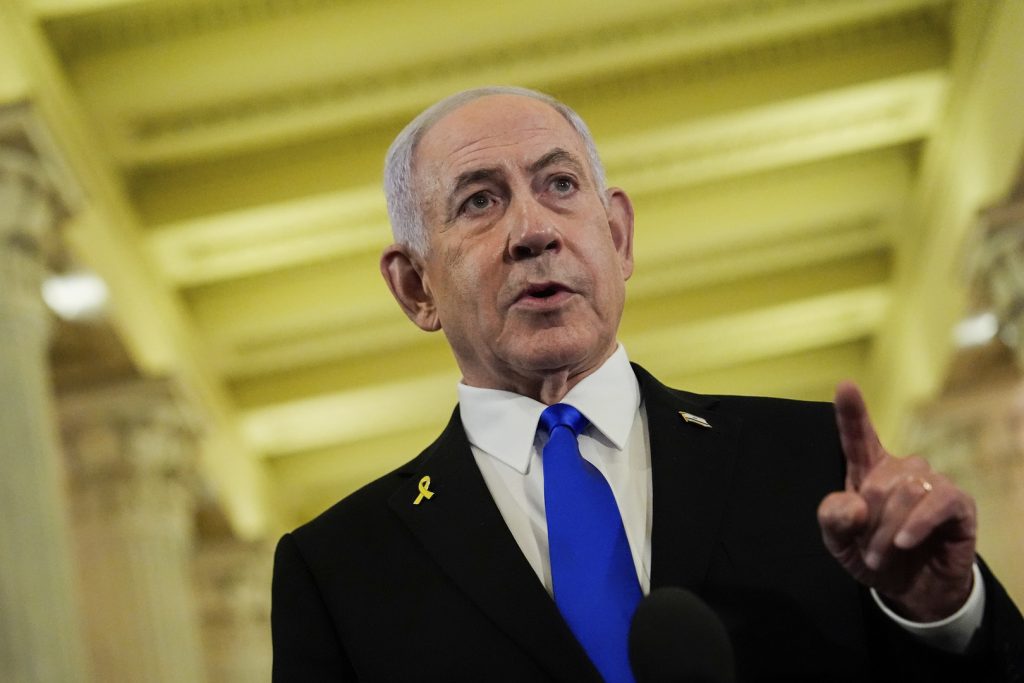
NewsFeed Israeli Prime Minister Benjamin Netanyahu said he would meet with President Trump again on Tuesday to discuss a Gaza ceasefire. He also praised Washington’s “unprecedented” military ties with Israel following a meeting with Capitol Hill lawmakers. Published On 8 Jul 20258 Jul 2025 Adblock test (Why?)
Wildfires shut airport near Marseille in France
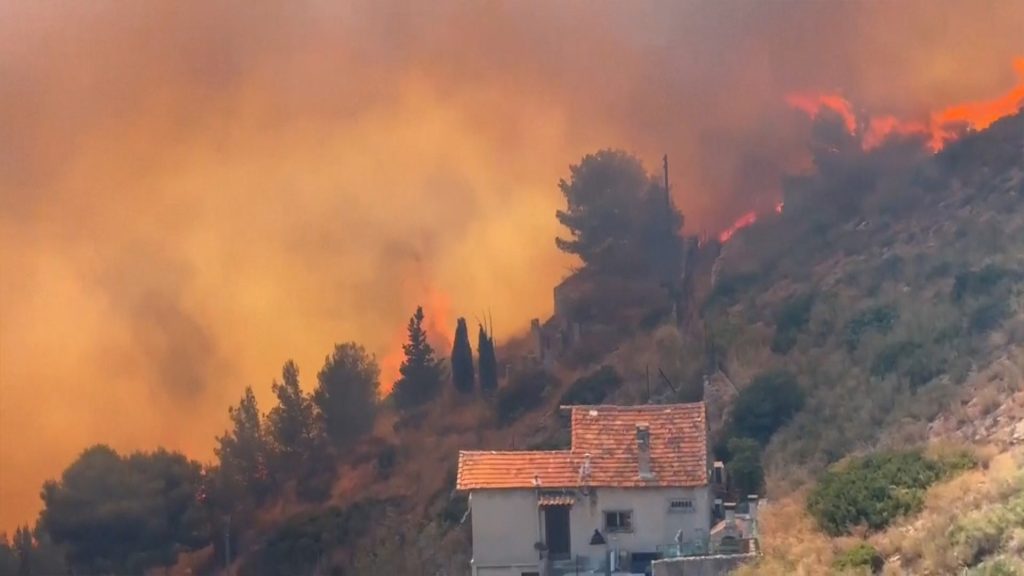
NewsFeed Wildfires near Marseille, France have forced the airport to close and injured nine firefighters as more than 700 hectares burned. Officials urged residents to stay indoors as heatwaves and strong winds fuel fire risks across southern France. Published On 8 Jul 20258 Jul 2025 Adblock test (Why?)
US envoy Steve Witkoff suggests Gaza ceasefire deal is close
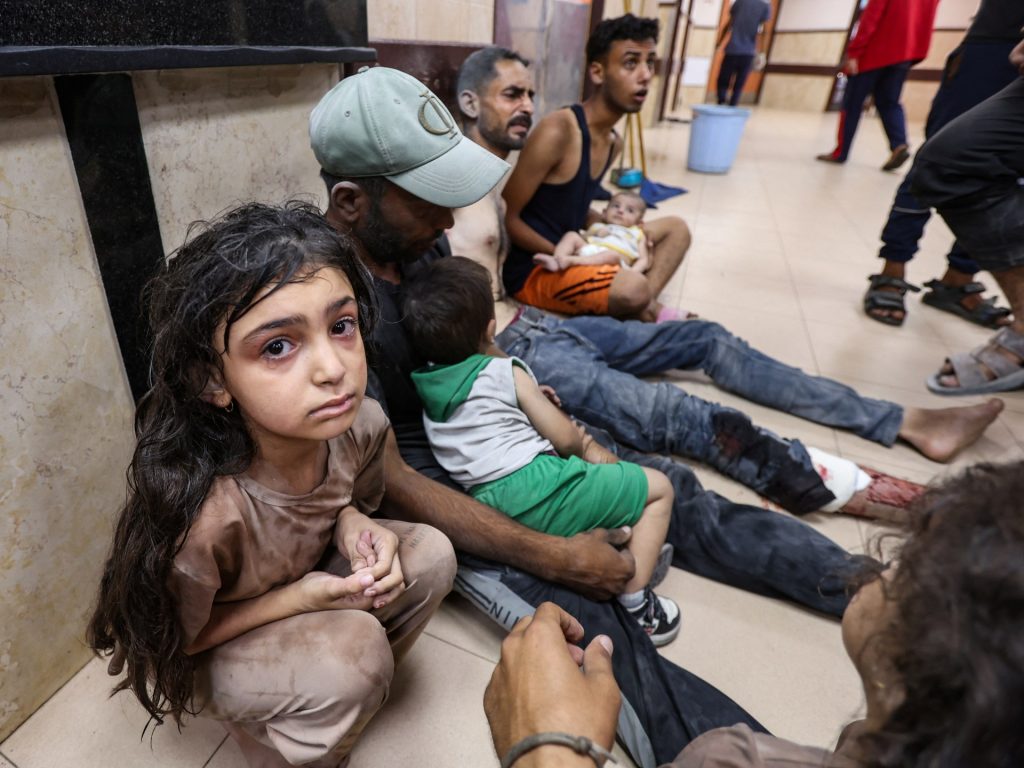
Trump aide says Washington ‘hopeful’ a 60-day truce between Israel and Hamas can be reached by the end of the week. An aide to United President Donald Trump has suggested a Gaza ceasefire is close, saying Washington hopes to see an agreement finalised by the end of the week. “We’re in proximity talks now, and we had four issues, and now we’re down to one after two days of proximity talks,” special US envoy Steve Witkoff told reporters at the White House on Tuesday. “So we are hopeful that by the end of this week, we will have an agreement that will bring us into a 60-day ceasefire.” Witkoff said the deal would see the release of 10 Israeli captives and the bodies of nine. He added that the Trump administration thinks the deal “will lead to a lasting peace in Gaza”. Earlier on Tuesday, Israeli Prime Minister Benjamin Netanyahu told reporters in Washington, DC, that while Israel “still has to finish the job in Gaza”, negotiators are “certainly working” on a ceasefire. Trump and Netanyahu dined together on Monday at the White House during the Israeli leader’s third US visit since the president began his second term on January 20. The two leaders are to meet again later on Tuesday. “He’s coming over later. We’re going to be talking about, I would say, almost exclusively Gaza. We’ve got to get that solved,” the US president told reporters at a cabinet meeting in the White House on Tuesday. “It’s a tragedy, and he wants to get it solved, and I want to get it solved, and I think the other side wants to.” Qatar confirmed on Tuesday that Hamas and Israeli delegations are in Doha to discuss the ceasefire proposal. Advertisement “There is a positive engagement right now. The mediation teams – the Qataris and the Egyptians – are working around the clock to make sure that there is some consensus built on the framework towards the talks,” Qatari Ministry of Foreign Affairs spokesperson Majed al-Ansari said. Israel’s war on Gaza has killed more than 57,500 Palestinians, internally displaced nearly the entire population of the enclave and placed hundreds of thousands of people on the verge of starvation. United Nations experts and rights group have described Israel’s military campaign in Gaza as a genocide. Netanyahu suggested on Monday that the US and Israel are working to ensure the mass displacement of Palestinians from Gaza – an idea first proposed by Trump in February. Israeli officials have been framing the push to remove all Palestinians from Gaza Gaza as an effort to encourage “voluntary migration” from the territory. “If people want to stay, they can stay, but if they want to leave, they should be able to leave. It shouldn’t be a prison. It should be an open place and give people a free choice,” Netanyahu told reporters. Rights advocates said the removal of Palestinians from Gaza, which would amount to ethnic cleansing, cannot be considered voluntary. Prominent legal expert Ralph Wilde said that with the widespread destruction, siege and daily attacks in Gaza, the concept of free choice to stay there or leave “is a lie”. “It’s forced displacement because that isn’t a choice that is made freely,” Wilde told Al Jazeera. Adblock test (Why?)
How strong is US manufacturing, as Trump’s tariff deadline looms?
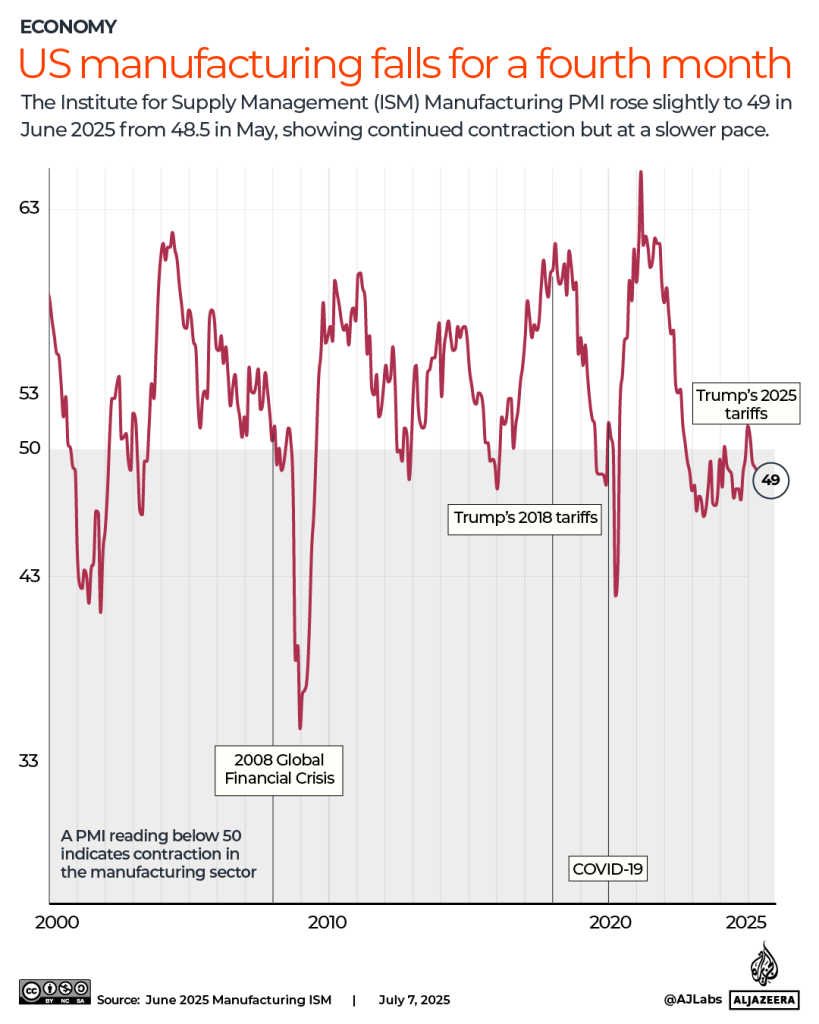
The global economy is on edge as United States President Donald Trump’s July 9 deadline looms for the imposition of double-digit tariffs on most trading partners. On Monday, Trump announced tariffs on 14 countries, ranging from 25 to 40 percent. The targeted countries include close US allies like Japan and South Korea, as well as Laos, Myanmar, Bangladesh, Cambodia, Tunisia, South Africa, Malaysia, Kazakhstan, Thailand, Indonesia, Serbia and Bosnia and Herzegovina. And with only a few trade deals in place, his administration is expected to announce the imposition of new levies on many more countries. Trump and Treasury Secretary Scott Bessent on Sunday said those new tariffs would come into effect on August 1. Trump’s initial April 2 “Liberation Day” announcement of across-the-board tariffs on countries around the world sent markets into a tailspin. Trump relented – temporarily – announcing a 90-day cessation on higher tariffs, while imposing a 10 percent baseline levy on all trading partners. Now, some experts fear that higher tariffs, if imposed after July 9, could push the global economy into a recession. Along with reducing the trade deficit, Trump’s argument for tariffs is that they will boost US manufacturing and protect jobs. He says tariffs will encourage US consumers to buy more US-made goods, increase the taxes raised and enhance investment in the US. But what is the current state of manufacturing in the US, and how has it fared in recent months amid the economic churn stirred by Trump’s policies? Advertisement Where are we now? In a bid to revitalise US industry, Trump announced a $14bn investment on May 30, brokering a partnership between US Steel and Nippon Steel tipped to create 70,000 jobs, according to the White House. The Trump administration has also highlighted investments announced by automakers, tech firms and chocolate companies, among others, as evidence of the return of manufacturing to US soil. According to the US Bureau of Economic Analysis, manufacturing contributed $2.9 trillion to the economy in the first quarter of 2025, a 0.6 percent increase from the corresponding period in 2024. That places it behind only finance, professional and business services, and government as the largest sectors contributing to the US economy. However, building that manufacturing base back to the heydays of the sector, when it dominated the US economy, will not be easy, caution many experts. They point out that the US is today missing many of the essential elements of a robust manufacturing framework, including skilled labour, government support and technology. Manufacturing accounted for more than 25 percent of gross domestic product (GDP) in the 1970s, but that came down to 13 percent by 2005. Its share has since dropped further, to about 9.7 percent in 2024. Finance, insurance, real estate, rental and leasing value added as a percentage of GDP was 21 percent in 2024, followed by professional and business services (13 percent) and government (11 percent). US manufacturing falls for a fourth month The Institute for Supply Management (ISM) Manufacturing Index, also known as the purchasing managers’ index (PMI), is a monthly indicator of economic activity based on a survey of purchasing managers at manufacturing firms nationwide. It serves as a primary indicator of the condition of the US economy. The PMI measures the change in production levels across the economy from month to month. A PMI above 50 indicates expansion, while a reading below 50 indicates contraction. In June, it registered 49 percent, marking a fourth consecutive month of contraction, though the rate of decline has slowed. (Al Jazeera) At the start of 2025, the PMI was in expansion territory – 50.9 percent in January and 50.3 percent in February, before slipping below 50 in March. Nine manufacturing industries reported growth in June, while six industries reported contraction. According to the Reuters news agency, economists say the lack of clarity on what happens after July 9 has left businesses unable to make long-term plans. Advertisement How many people does manufacturing employ? According to the US Bureau of Labor Statistics, in June 2025 there were some 12.75 million people employed in the manufacturing sector in the US. Employment in manufacturing has increased from five years ago – in June 2020, some 11.95 million people were employed. However, current employment levels are still far below the peak of nearly 20 million people hired in manufacturing jobs in the late 1970s, reflecting the long-term decline in the sector’s contribution to employment in the US. US manufacturing job openings increased in May – 414,000, up from 392,000 in April – but actual hiring declined, hinting at uncertainties in the labour market over the Trump administration’s tariff policies. US manufacturing compared to the rest of the world The US has seen a decline in its share of global manufacturing, while China has taken over as the largest manufacturing country by value-added. China contributed $4.8 trillion to the global GDP through manufacturing in 2022, followed by the US at $2.7 trillion that year. Still, the US remains a major player and adds more manufacturing value than the third-, fourth-, fifth- and sixth-largest countries combined. And it does so with far fewer workers than its competitors. Adblock test (Why?)
Poland imposes controls on Germany, Lithuania borders to check migration
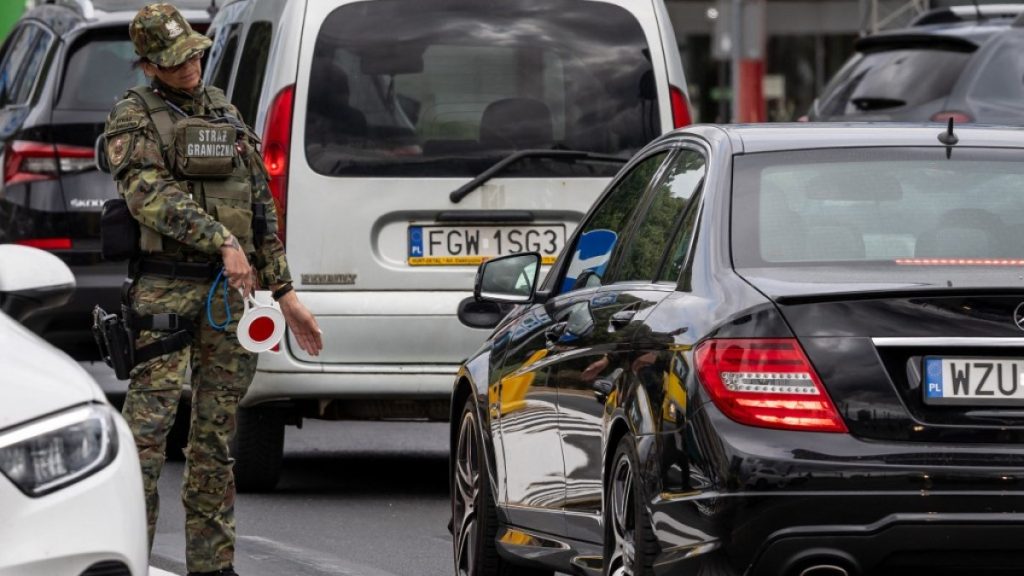
Polish government says step aimed to check migrants more thoroughly amid public concerns over immigration. Poland has reintroduced temporary checks on its borders with Germany and Lithuania, citing a growing influx of undocumented migrants and increasing public concern over security. Prime Minister Donald Tusk announced the move on Monday, arguing that Warsaw needed to “redirect” migration routes that bypass barriers along the Belarusian border and instead pass through neighbouring Latvia and Lithuania. “To redirect this stream of people, which is deflected by our barrier, but which wants to cross Poland again through the border with Latvia and Lithuania, and further into Europe,” Tusk said. The decision came amid heightened tensions across Europe over irregular migration, with other Schengen members like Germany, Belgium and the Netherlands having already taken similar steps over the past 18 months, putting strain on the European Union’s passport-free travel zone. Germany has maintained controls on its border with Poland since 2023, but recently adopted a tougher approach, rejecting undocumented arrivals and sending them back to Poland under EU and bilateral agreements. Polish authorities say this has placed an unfair burden on their country. Knut Abraham, Germany’s envoy for Polish relations, warned the new checks could cause traffic congestion and disrupt trade, without curbing migration effectively. Similar concerns were raised by Rafal Gronicz, mayor of the border town of Zgorzelec, who dismissed fears of a migrant crisis as exaggerated. “As long as I live, I have never known anyone who wanted to escape from Germany to Poland,” he told local radio. “There are no pressing waves of migrants walking around Zgorzelec.” Advertisement Polish Interior Minister Tomasz Siemoniak said checks on the German border will be lifted when Berlin ends its tougher controls. “If Germany lifts its controls, we are not going to delay either,” Siemoniak said. “We want this movement to be absolutely free, that the problems of illegal migrant and migration be resolved together, without either side suffering.” Tensions have escalated in recent weeks in Poland after a Venezuelan national was charged with murdering a 24-year-old woman in Torun. That killing triggered mass protests led by nationalist groups, with some 10,000 people marching on Sunday in her memory. A separate incident on Saturday saw a Polish man fatally stabbed during a brawl in the northern town of Nowe. Authorities said on Monday that 13 people had been arrested – three Poles and 10 Colombians. Angry crowds gathered outside a workers’ hostel where the Colombians had been staying, state media reported. Far-right groups have also begun patrolling Poland’s western frontier, claiming to protect the country from migrant flows. Human rights organisations condemned these vigilante efforts, warning they fuel xenophobia and undermine trust in official institutions. “The actions of these self-proclaimed groups are the result of a radicalising political narrative,” said the Helsinki Foundation for Human Rights. “Debate on migration should be grounded in facts, not fear.” Adblock test (Why?)
Netanyahu, Trump discuss forced transfer of Palestinians out of Gaza
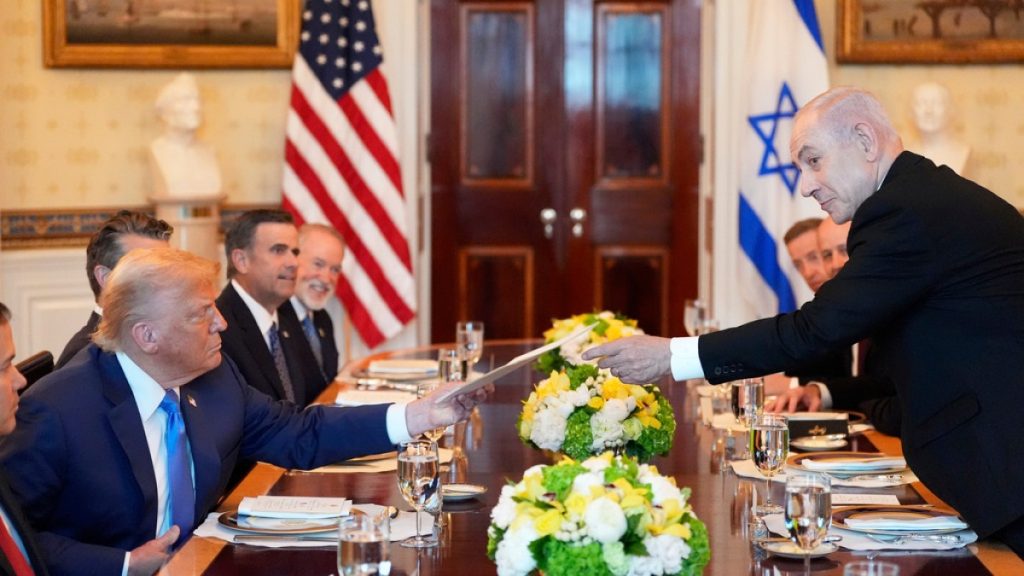
Israeli Prime Minister Benjamin Netanyahu has met United States President Donald Trump at the White House, with the two leaders repeating their controversial proposal to forcibly transfer thousands of Palestinians out of the Gaza Strip. Trump and Netanyahu met for dinner in the Blue Room of the White House on Monday as indirect talks in Qatar between Israel and Hamas on US-backed proposals for a 60-day ceasefire to end the 21-month Gaza war appeared to gather some momentum. Netanyahu told reporters present at the meeting that the US and Israel were working with other countries to give Palestinians a “better future”, suggesting that the residents of Gaza could move to neighbouring nations. “If people want to stay, they can stay, but if they want to leave, they should be able to leave. It shouldn’t be a prison. It should be an open place and give people a free choice,” Netanyahu said. “We’re working with the United States very closely about finding countries that will seek to realise what they always say, that they wanted to give the Palestinians a better future. I think we’re getting close to finding several countries.” Trump, who earlier this year caused outrage when he floated his idea of relocating Palestinians and taking over the Strip to turn it into a “Riviera of the Middle East”, said there had been “great cooperation” on the matter from “surrounding countries”. “So something good will happen,” he added. ‘Recipe for catastrophe’ “This is something the Israelis have been saying for some time, calling it the ‘voluntary migration’ of Palestinians from their homelands. But of course, this has been condemned as ethnic cleansing,” Al Jazeera’s Hamdah Salhut said, reporting from Amman, Jordan. Advertisement Former Israeli diplomat Alon Pinkas told Al Jazeera that just because there are ongoing reports and statements about relocating Palestinians in Gaza to other countries, it does not mean that there is a “practical plan”. “The fact that the Israeli defence minister blurts some ideas out, or even the prime minister, or even the president of the United States, doesn’t mean there is a plan,” he said. “In early February, Trump spoke about a Palestinian Riviera, and within 36 hours, he changed that from a Riviera for the Palestinians to the Palestinians will be expelled,” he added. Pinkas explained that amid reports that the Boston Consulting Group, which has been asked to come up with a plan to relocate Palestinians, it “doesn’t mean it’s implementable, it doesn’t mean it’s practical”. “[It] is a recipe for catastrophe because it ensures that no [post-war] agreement in Gaza is durable,” Pinkas said. Trump and Netanyahu met as Israeli and Hamas negotiators held a second day of indirect talks in Qatar, seated in different rooms in the same building. Proposals for a 60-day pause in fighting envisage a phased release of Hamas-held captives and Palestinian prisoners, Israeli troop withdrawals from parts of Gaza, and discussions on completely ending the war. But a sticking point is whether the ceasefire will end the war altogether. Hamas has said it is willing to free all the captives in exchange for all Palestinian prisoners and a full Israeli withdrawal from Gaza. Netanyahu says the war will end once Hamas surrenders, disarms and goes into exile – something the Palestinian group refuses to do. In advance of Netanyahu’s visit to the US, Trump predicted that a ceasefire deal could be reached this week. But Netanyahu appeared cagey, ruling out a full Palestinian state, saying Israel will “always” keep security control over the Gaza Strip. Monday’s talks in Qatar ended with no announcements. Trump’s special envoy Steve Witkoff, who played an important role in crafting the proposals, is expected to join negotiators in Qatar this week. Coveted Nobel nomination Trump and Netanyahu’s discussions came just over two weeks after the former ordered the bombing of Iranian nuclear sites in support of Israeli air strikes, before announcing a ceasefire in the 12-day Israel-Iran war. During their meeting, Netanyahu gave Trump a letter that he said had been used to nominate the US president for the Nobel Peace Prize. Trump, appearing pleased by the gesture, thanked him. Advertisement “So much of this is about optics,” said Al Jazeera’s Phil Lavelle, reporting from Washington, DC. “Of course, the [Israeli] prime minister will be very keen to make sure that this is seen back home as a major success … He is very keen to make sure that he is portrayed as being back in the good favours of Donald Trump.” Trump has made little secret of the fact that he covets a Nobel, trumpeting recent truces that his administration facilitated between India and Pakistan, and the Democratic Republic of the Congo (DRC) and Rwanda. During the meeting, Trump indicated that Iranian officials have reached out to the US to schedule talks about Iran’s nuclear programme. Negotiations had started in April but were scuppered after Israel launched attacks last month. “We have scheduled Iran talks, and they … want to talk. They took a big drubbing,” said the US president. Sitting at the table with Trump, Witkoff said the meeting would be soon, perhaps in a week. Iranian President Masoud Pezeshkian said in an interview with US journalist Tucker Carlson, released on Monday, that he believed Tehran could resolve its differences with Washington through dialogue. Netanyahu, who also met Witkoff and Secretary of State Marco Rubio on Monday, is due to meet Vice President JD Vance on Tuesday morning (about 13:30 GMT). Adblock test (Why?)
US revokes ‘terrorist’ designation for Syrian president’s former group HTS
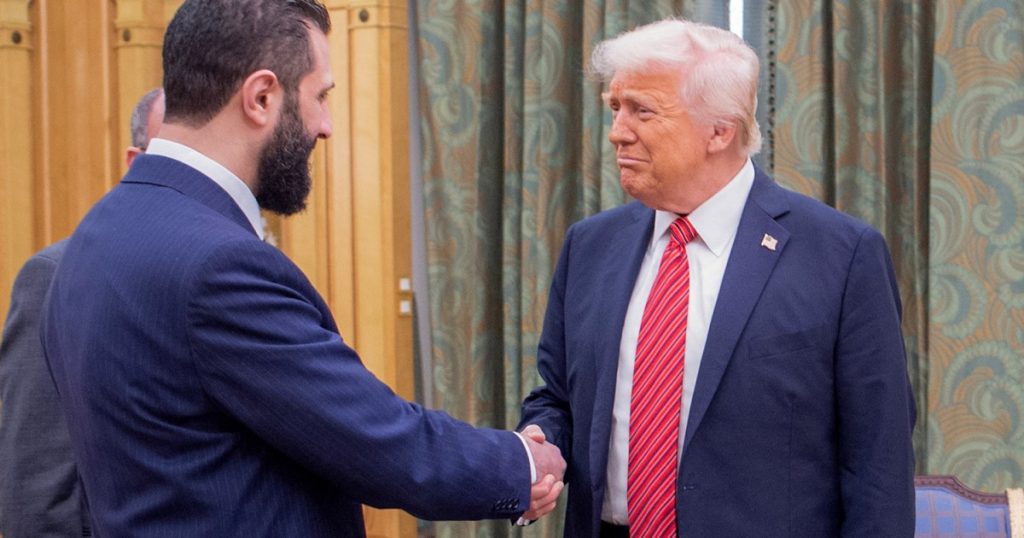
The move follows the lifting of sanctions on Damascus after the fall of the al-Assad government last year. The United States will revoke its designation of Hayat Tahrir al-Sham (HTS) as a foreign terrorist organisation (FTO) as Washington softens its approach to post-war Syria following the fall of Bashar al-Assad’s government last year. The decision, which takes effect on Tuesday, comes as part of US President Donald Trump’s broader strategy to re-engage with Syria and support its reconstruction after more than a decade of devastating conflict. “This FTO revocation is an important step in fulfilling President Trump’s vision of a stable, unified, and peaceful Syria,” US Secretary of State Marco Rubio said in a statement Monday. HTS had been designated as a “terrorist” group by the US since 2018 due to its former ties to al-Qaeda. The group emerged out of the al-Nusra Front, once al-Qaeda’s official branch in Syria, but formally severed those ties in 2016 after HTS leader Ahmed al-Sharaa declared the group’s independence. Al-Sharaa, who led the opposition forces that removed al-Assad in a lightning offensive last December, has since become Syria’s president. He has launched what many experts have described as a charm offensive aimed at Western powers, including meetings with French President Emmanuel Macron and, most recently, Trump in Riyadh in May. The Trump administration and the European Union have since lifted sanctions on Syria. “In line with President Trump’s May 13 promise to deliver sanctions relief to Syria, I am announcing my intent to revoke the Foreign Terrorist Organization (FTO) designation of al-Nusrah Front, also known as Hay’at Tahrir al-Sham (HTS), under the Immigration and Nationality Act,” Rubio said. Advertisement “Tomorrow’s action follows the announced dissolution of HTS and the Syrian government’s commitment to combat terrorism in all its forms.” HTS was dissolved in late January, with its forces folded into the official Syrian military and security forces. Damascus welcomed the US decision as a step towards normalisation. In a statement, Syria’s Ministry of Foreign Affairs said the delisting of HTS was a “positive step toward correcting a course that previously hindered constructive engagement”. The ministry added that it hoped the move would “contribute to the removal of remaining restrictions that continue to impact Syrian institutions and officials, and open the door to a rational, sovereign-based approach to international cooperation”. Meanwhile, HTS remains under United Nations Security Council sanctions, which were imposed in 2014 over its previous affiliation with al-Qaeda. Al-Sharaa also remains under UNSC sanctions, which can only be removed by the Council itself. Al-Sharaa is reportedly preparing to attend the UN General Assembly in New York this September. Adblock test (Why?)

